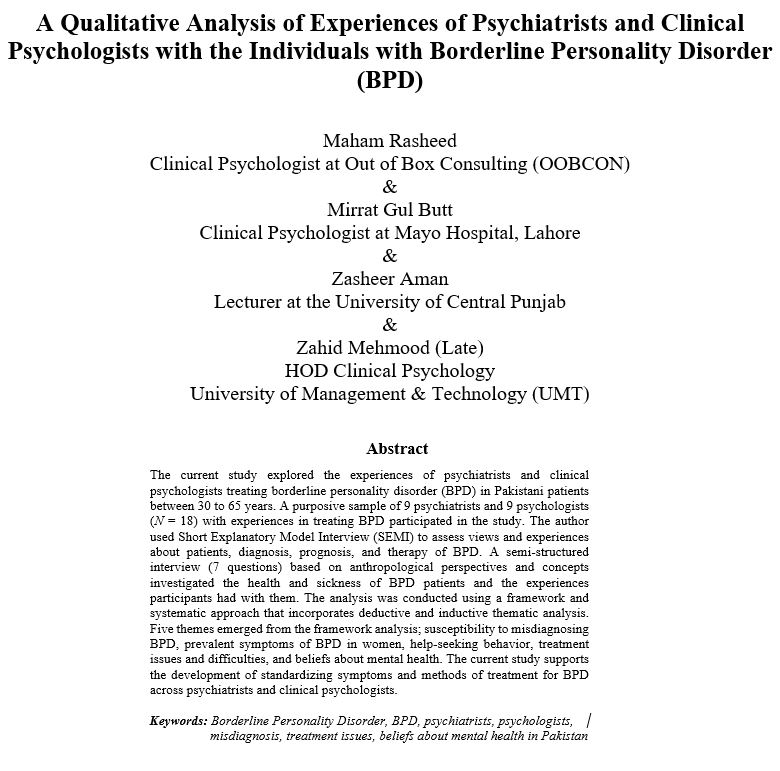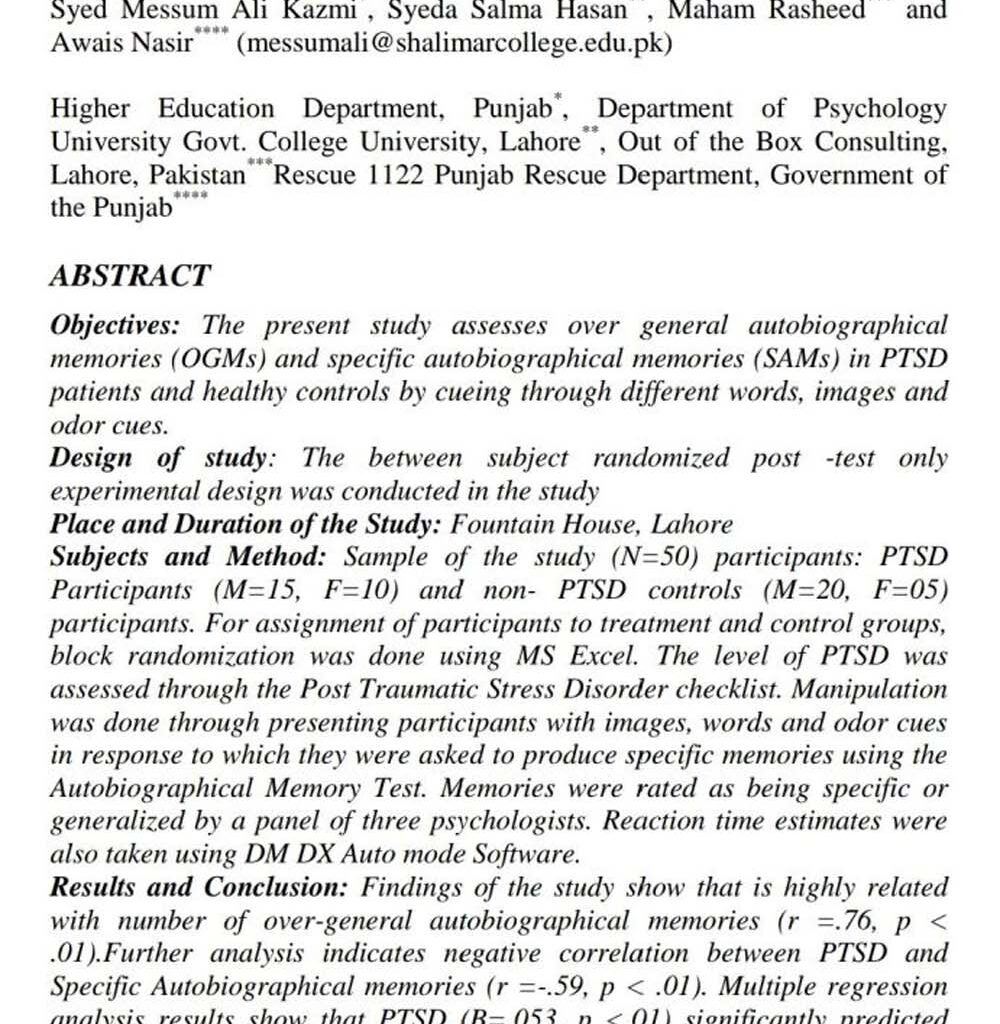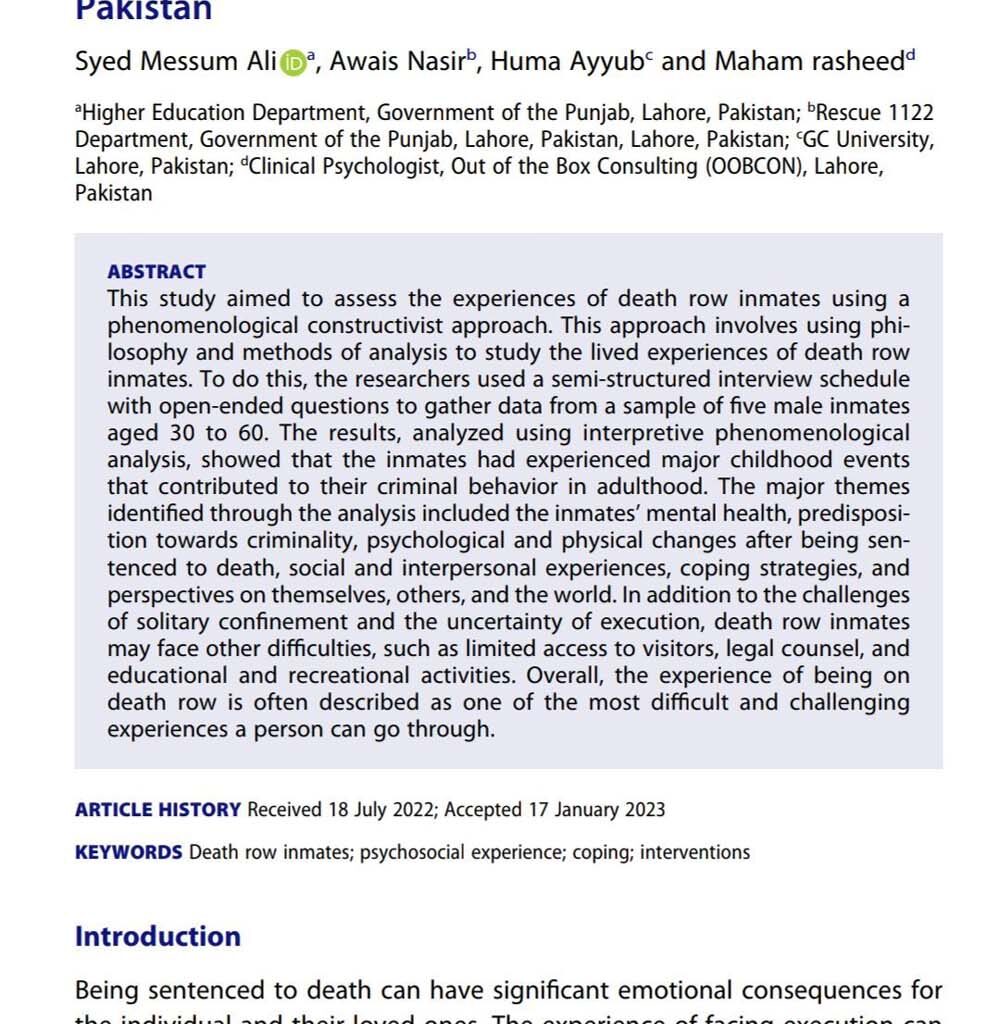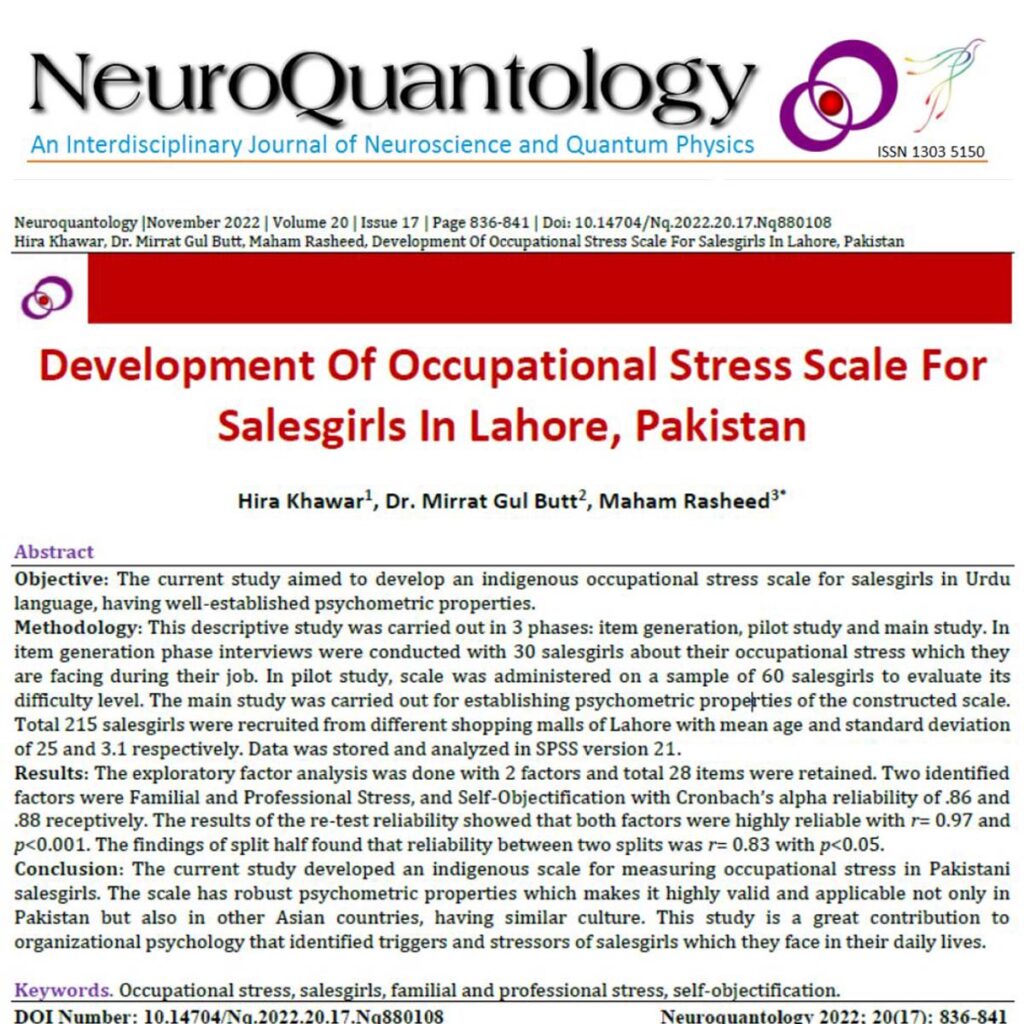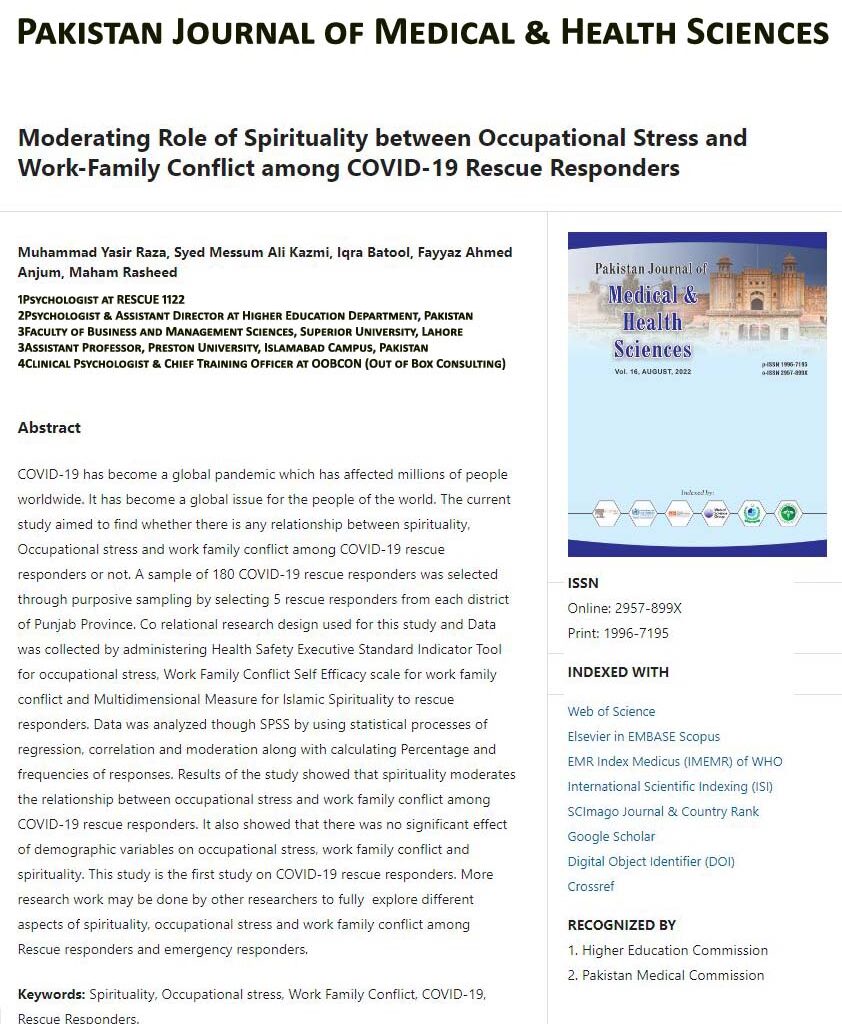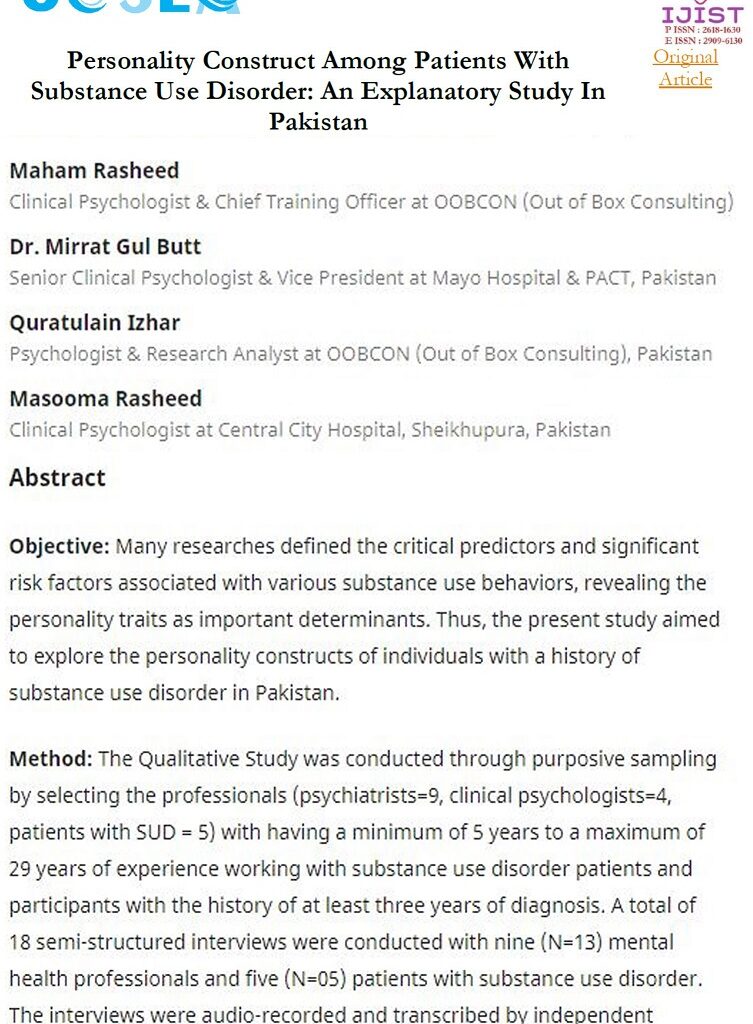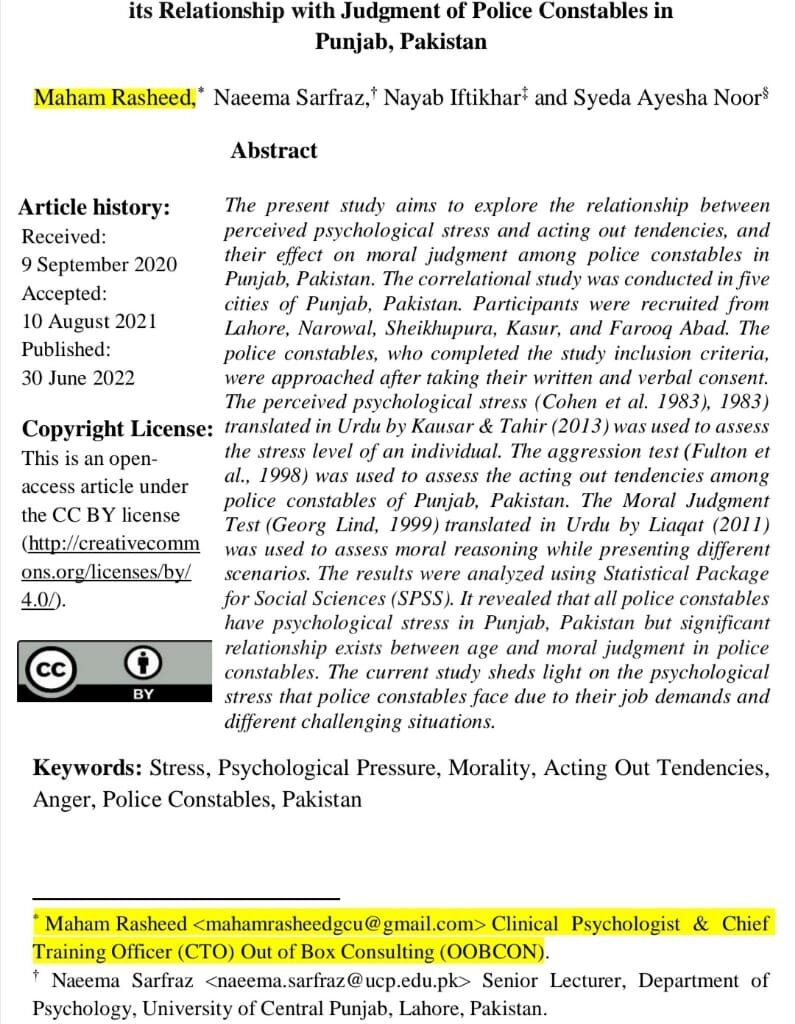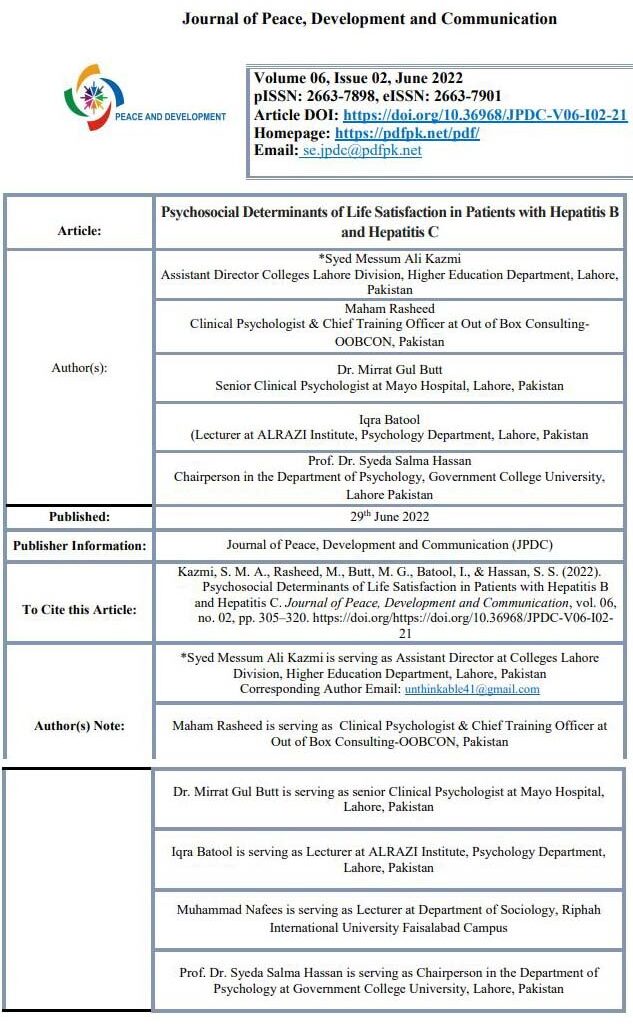Our Researches

8. A Qualitative Analysis of Experiences of Psychiatrists and Clinical Psychologists with the Individuals with Borderline Personality Disorder (BPD)
8. Rasheed, M, Butt. M. G., Aman. Z., Mehmood. Zahid., (2023) ” A Qualitative Analysis of Experiences of Psychiatrists and Clinical Psychologists with the Individuals with Borderline Personality Disorder (BPD)” Pakistan Journal of Social and Clinical Psychology | Volume: 20, | March 2023
ABSTRACT
The current study explored the experiences of psychiatrists and clinical psychologists treating borderline personality disorder (BPD) in Pakistani patients between 30 to 65 years. A purposive sample of 9 psychiatrists and 9 psychologists (N = 18) with experiences in treating BPD participated in the study. The author used Short Explanatory Model Interview (SEMI) to assess views and experiences about patients, diagnosis, prognosis, and therapy of BPD. A semi-structured interview (7 questions) based on anthropological perspectives and concepts investigated the health and sickness of BPD patients and the experiences participants had with them. The analysis was conducted using a framework and systematic approach that incorporates deductive and inductive thematic analysis. Five themes emerged from the framework analysis; susceptibility to misdiagnosing BPD, prevalent symptoms of BPD in women, help-seeking behavior, treatment issues and difficulties, and beliefs about mental health. The current study supports the development of standardizing symptoms and methods of treatment for BPD across psychiatrists and clinical psychologists.
Keywords: Borderline Personality Disorder, BPD, psychiatrists, psychologists, misdiagnosis, treatment issues, beliefs about mental health in Pakistan
7. POST-TRAUMATIC STRESS DISORDER AND OVER GENERAL AUTOBIOGRAPHICAL MEMORY: AN EXPERIMENTAL APPROACH
Kazmi S. M. A., Hasan, S. S., Rasheed, M, Nasir, A, (2023). ” POST-TRAUMATIC STRESS DISORDER AND OVER GENERAL AUTOBIOGRAPHICAL MEMORY: AN EXPERIMENTAL APPROACH” Pakistan Journal of Clinical Psychology |January 2023, Retrieved from http://www.pjcpku.com/index.php/pjcp/issue/view/23
ABSTRACT
Objectives: The present study assesses over general autobiographical memories (OGMs) and specific autobiographical memories (SAMs) in PTSD patients and healthy controls by cueing through different words, images and odor cues.
Design of study: The between subject randomized post -test only experimental design was conducted in the study
Place and Duration of the Study: Fountain House, Lahore
Subjects and Method: Sample of the study (N=50) participants: PTSD Participants (M=15, F=10) and non- PTSD controls (M=20, F=05) participants. For assignment of participants to treatment and control groups, block randomization was done using MS Excel. The level of PTSD was assessed through the Post Traumatic Stress Disorder checklist. Manipulation was done through presenting participants with images, words and odor cues in response to which they were asked to produce specific memories using the Autobiographical Memory Test. Memories were rated as being specific or generalized by a panel of three psychologists. Reaction time estimates were also taken using DM DX Auto mode Software.
Results and Conclusion: Findings of the study show that is highly related with number of over-general autobiographical memories (r =.76, p < .01).Further analysis indicates negative correlation between PTSD and Specific Autobiographical memories (r =-.59, p < .01). Multiple regression analysis results show that PTSD (B=.053, p <.01) significantly predicted over general autobiographical memories. Thus, present research indicated that PTSD is a causal factor that leads to impairment in the retrieval of specific autobiographical memories. It was also found that individuals with PTSD tend to show longer reaction times.
Keywords: PTSD; over general autobiographical memory; words images and odor cues
6. A phenomenological analysis of the experiences of death row inmates: an exploratory study from Pakistan
Kazmi S. M. A., Nasir, A., Ayyub, H., Rasheed, M, (2023). ” A phenomenological analysis of the experiences of death row inmates: an exploratory study from Pakistan” The Journal of Forensic Psychiatry & Psychology |January 2023, Retrieved from https://doi.org/10.1080/14789949.2023.2170907
ABSTRACT
This study aimed to assess the experiences of death row inmates using a phenomenological constructivist approach. This approach involves using philosophy and methods of analysis to study the lived experiences of death row inmates. To do this, the researchers used a semi-structured interview schedule with open-ended questions to gather data from a ample of five male inmates aged 30 to 60. The results, analyzed using interpretive phenomenological analysis, showed that the inmates had experienced major childhood events that contributed to their criminal behavior in adulthood. The major hemes identified through the analysis included the inmates’ mental health, predisposition towards criminality, psychological and physical changes after being sentenced to death, social and interpersonal experiences, coping strategies, and perspectives on themselves, others, and the world. In addition to the challenges of solitary confinement and the uncertainty of execution, death row inmates may face other difficulties, such as limited access to visitors, legal counsel, and educational and recreational activities. Overall, the experience of being on death row is often described as one of the most difficult and challenging experiences a person can go through.
Keywords: Death row inmates; psychosocial experience; coping; interventions
5. Development Of Occupational Stress Scale For Salesgirls In Lahore, Pakistan
Khawar, H, Butt. M. G., Rasheed, M., (2022). ”Development Of Occupational Stress Scale For Salesgirls In Lahore, Pakistan” Neuroquantology |November 2022 | Volume 20 | Issue 17 | Page 836-841 | Doi: 10.14704/Nq.2022.20.17.Nq880108, Retrieved from https://www.neuroquantology.com/article.php?id=11171
ABSTRACT
Objective: The current study aimed to develop an indigenous occupational stress scale for salesgirls in Urdu language, having well-established psychometric properties.
Methodology: This descriptive study was carried out in 3 phases: item generation, pilot study and main study. In item generation phase interviews were conducted with 30 salesgirls about their occupational stress which they are facing during their job. In pilot study, scale was administered on a sample of 60 salesgirls to evaluate its difficulty level. The main study was carried out for establishing psychometric properties of the constructed scale. Total 215 salesgirls were recruited from different shopping malls of Lahore with mean age and standard deviation of 25 and 3.1 respectively. Data was stored and analyzed in SPSS version 21.
Results: The exploratory factor analysis was done with 2 factors and total 28 items were retained. Two identified factors were Familial and Professional Stress, and Self-Objectification with Cronbach’s alpha reliability of .86 and .88 receptively. The results of the re-test reliability showed that both factors were highly reliable with r= 0.97 and p<0.001. The findings of split half found that reliability between two splits was r= 0.83 with p<0.05.
Conclusion: The current study developed an indigenous scale for measuring occupational stress in Pakistani salesgirls. The scale has robust psychometric properties which makes it highly valid and applicable not only in Pakistan but also in other Asian countries, having similar culture. This study is a great contribution to organizational psychology that identified triggers and stressors of salesgirls which they face in their daily lives.
Keywords: Occupational stress, salesgirls, familial and professional stress, self-objectification.
4. Moderating Role of Spirituality between Occupational Stress and
Work-Family Conflict among COVID-19 Rescue Responders
Raza, M Y., Kazmi, S. M. A., Batool, I., Anjum, F A., Rasheed, M., (2022).” Moderating Role of Spirituality between Occupational Stress and Work-Family Conflict among COVID-19 Rescue Responders” Pakistan Journal of Medical & Health Sciences: Vol. 16 No. 08, Retrieved from https://pjmhsonline.com/index.php/pjmhs/article/view/2562 PDF
ABSTRACT
COVID-19 has become a global pandemic which has affected millions of people worldwide. It has become a global issue for the people of the world. The current study aimed to find whether there is any relationship between spirituality, Occupational stress and work family conflict among COVID-19 rescue responders or not. A sample of 180 COVID-19 rescue responders was selected through purposive sampling by selecting 5 rescue responders from each district of Punjab Province. Co relational research design used for this study and Data was collected by administering Health Safety Executive Standard Indicator Tool for occupational stress, Work Family Conflict Self Efficacy scale for work family conflict and Multidimensional Measure for Islamic Spirituality to rescue responders. Data was analyzed though SPSS by using statistical processes of regression, correlation and moderation along with calculating Percentage and frequencies of responses.
Results of the study showed that spirituality moderates the relationship between occupational stress and work family conflict among COVID-19 rescue responders. It also showed that there was no significant effect of demographic variables on occupational stress, work family conflict and spirituality. This study is the first study on COVID-19 rescue responders. More research work may be done by other researchers to fully explore different aspects of spirituality, occupational stress and work family conflict among Rescue responders and emergency responders.
Keywords: Spirituality, Occupational stress, Work Family Conflict, COVID-19, Rescue Responders.
3. Personality Construct Among Patients With Substance Use Disorder:
An Explanatory Study In Pakistan
Rasheed. M, Butt. G. M, Izhar. Q, Rasheed. M, “Personality construct among Patients with Substance Use Disorder: An explanatory study in Pakistan”. International Journal of Innovations in Science & Technology, 4(6), 42–49. Retrieved from https://journal.50sea.com/index.php/IJIST/article/view/369
ABSTRACT
Present study was to assess the role of grit, metacognitive awareness and depression in life satisfaction of patients with Hepatitis B & C. It was hypothesized that these constructs would be significantly associated with one another, specifically, that depression would negatively predict life satisfaction while grit and metacognitive awareness would have positive associations with life satisfaction. The study used a correlational research design. The sample size of the study was 200 including (N=120 males, N= 80 females) diagnosed with hepatitis b and C which selected from various healthcare settings of Lahore. Purposive sampling technique was used for sample selection. Beck Depression Inventory, Short Grit Scale, Satisfaction with Life Scale and Metacognitive Awareness Inventory were used for data collection. The results showed that grit and metacognitive awareness is positively associated with life satisfaction while depression has a significant negative association. Depression and Metacognitive Awareness significantly predicted and mediating influence on the association between grit and life satisfaction.
Keywords: Grit, Depression, Metacognitive Awareness, Life Satisfaction, Hepatitis B & C
2. Perceived Psychological Stress, Acting out Tendencies, and
its Relationship with Judgment of Police Constables in
Punjab, Pakistan
Kazmi, S. M. A., Rasheed, M., Butt, M. G., Batool, I., & Hassan, S. S. (2022). Psychosocial Determinants of Life Satisfaction in Patients with Hepatitis B and Hepatitis C. Journal of Peace, Development and Communication, vol. 06, no. 02, pp. 305–320. https://doi.org/https://doi.org/10.36968/JPDC-V06-I0221
ABSTRACT
Objective: Many researches defined the critical predictors and significant risk factors associated with various substance use behaviors, revealing the personality traits as important determinants. Thus, the present study aimed to explore the personality constructs of individuals with a history of substance use disorder in Pakistan.
Method: The Qualitative Study was conducted through purposive sampling by selecting the professionals (psychiatrists=9, clinical psychologists=4, patients with SUD = 5) with having a minimum of 5 years to a maximum of 29 years of experience working with substance use disorder patients and participants with the history of at least three years of diagnosis. A total of 18 semi-structured interviews were conducted with nine (N=13) mental health professionals and five (N=05) patients with substance use disorder. The interviews were audio-recorded and transcribed by independent researchers. The transcripts were analyzed using a systematic approach that incorporates inductive thematic analysis.
Results: The themes that emerged after analyses were combined under the main three headings: Social, Cultural and Psychological/individual factors. The main results indicated that authoritative parenting style, family lifestyles, pleasure-seeking, enhanced energy, dependent personality traits, emotional instability and conflicting interpersonal relationship lead to substance use which can be addressed through early intervention.
Keywords: Personality traits, Personality constructs, substance use disorder, drugs
1. Psychosocial Determinants of Life Satisfaction in Patients with Hepatitis B and Hepatitis C
Rasheed, M., Sarfraz, N., Iftikhar, N., & Noor, S. A. (2022). Perceived Psychological Stress, Acting out Tendencies, and its Relationship with Judgment of Police Constables in Punjab, NUST JOURNAL OF SOCIAL SCIENCES AND HUMANITIES, Vol.8 No. 1 (January-June 2022) pp. 107-118, https://doi.org/10.51732/njssh.v8i1.122
ABSTRACT
Present study was to assess the role of grit, metacognitive awareness and depression in life satisfaction of patients with Hepatitis B & C. It was hypothesized that these constructs would be significantly associated with one another, specifically, that depression would negatively predict life satisfaction while grit and metacognitive awareness would have positive associations with life satisfaction. The study used a correlational research design. The sample size of the study was 200 including (N=120 males, N= 80 females) diagnosed with hepatitis b and C which selected from various healthcare settings of Lahore. Purposive sampling technique was used for sample selection. Beck Depression Inventory, Short Grit Scale, Satisfaction with Life Scale and Metacognitive Awareness Inventory were used for data collection. The results showed that grit and metacognitive awareness is positively associated with life satisfaction while depression has a significant negative association. Depression and Metacognitive Awareness significantly predicted and mediating influence on the association between grit and life satisfaction.
Keywords: Grit, Depression, Metacognitive Awareness, Life Satisfaction, Hepatitis B & C

